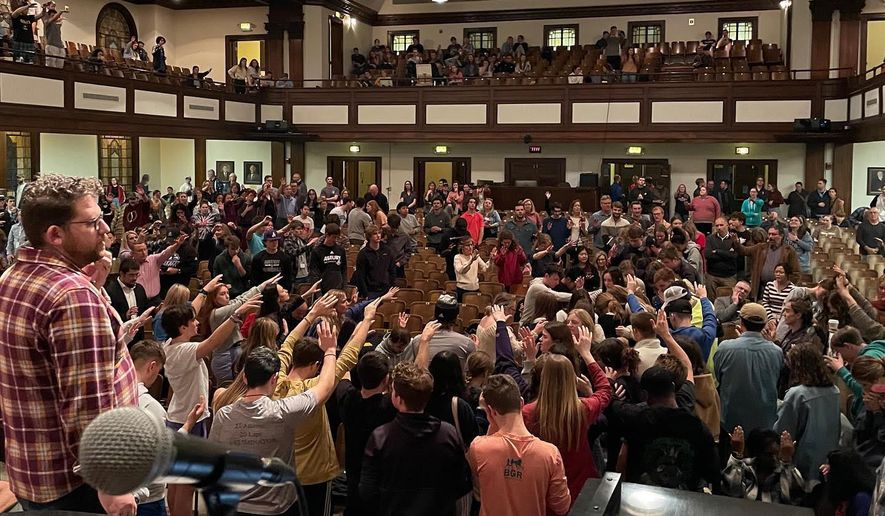OPINION:
“I’ve never seen anything like that. It looked more like ‘The 700 Club’ than it did ESPN for a bit there.”
That’s how University of Colorado at Colorado Springs religious studies professor Jeffrey Scholes described the public prayer that broke out on ESPN in the wake of Buffalo Bills safety Damar Hamlin collapsing and suffering cardiac arrest at a Jan. 2 NFL game.
He specifically addressed the stunning moment that former NFL quarterback and ESPN analyst Dan Orlovsky stopped during a live ESPN show, bowed his head and prayed for Mr. Hamlin.
But the invocations went well beyond that captivating, on-air moment.
What started as a typical call for “thoughts and prayers” quickly snowballed into a national — scratch that, international – quest to implore God to heal Mr. Hamlin.
At the time, I was intrigued, especially as nearly every metric shows American culture sliding off the edge of sanity into debased, post-Christian chaos. I assumed it was an isolated incident and appreciated it for what it was, but weeks later, new cultural developments began to unfold — sentiments and events that forced me to ponder whether something deeper is percolating.
Days after Mr. Hamlin started to heal, a new survey from Summit.org and McLaughlin and Associates found 67% of American voters affirmed a head-turning statement: “Public calls for prayer after a national tragedy are effective” and valuable.
Less than 20% called such prayers “pointless,” showcasing a fascinating belief in the power of invocation among the majority of Americans — yet another unexpected development.
But then came the most stunning event: A Feb. 8 chapel service at Asbury University in Wilmore, Kentucky, transformed into an international movement and “revival” — a massive, 24/7 prayer service that didn’t end for more than two weeks.
Students, faculty, local residents and eventually people from all over the U.S. flocked to the campus to sing praise and worship music, share testimonies, and hear sermons. It was a nonstop church service that captivated secular and Christian media as students openly shared the life-changing spiritual experiences they have witnessed.
“The Holy Spirit chose to just fall down and touch our hearts,” Alexandra Presta, a senior at Asbury University, told me when she was about 120 hours into the revival. “This is purely God moving and keeping people here and bringing more [who are] continuing to cross state lines and even across the country now. It’s absolutely insane.
“We know that our culture’s going to be changed by this.”
Interestingly, these revivals have broken out throughout American history and on the Asbury campus, in particular. A 1970 revival there saw 144 hours of worship but was dwarfed by the spectacular events observed last month.
Here’s the thing about the most recent revival, though: It didn’t stop at Asbury. The massive resurgence spread to Lee University in Cleveland, Tennessee, with reports of similar events breaking out on other campuses and among kids as young as middle school.
Rob Fultz, the campus pastor at Lee, told me he was anything but surprised by these circumstances, sharing his belief that a massive revival is on the horizon.
“This is something that God really impressed on my heart for this generation: The greatest revival in human history will come in this generation,” he said. “It may not look like anything that we’ve ever seen before, but it will happen.”
It’s hard to look at these events and not see something brewing — a spiritual hurricane forming at a time when confusion, secularism, hate, rage and anti-Christian sentiment are seething. While so many have appropriately lamented the rot overtaking our culture, these pockets of revival that initially seemed isolated only seem to intensify.
Despite the mess before us, people appear to be hearing the truth and responding with clamor, curiosity and hunger.
Last weekend, yet another development stunned onlookers when “Jesus Revolution,” a film about the Jesus movement in the 1970s, blasted past the original opening box-office estimate of $6 million to $7 million and raked in $15.5 million, coming in third place.
The intense irony of the film’s release is that it documents a time decades ago when people were feeling despondent, destitute and concerned about culture. People were turning to drugs and individual whims and were reeling from the Vietnam War — and that’s precisely when revival broke out among American youths.
The parallels to today’s culture are fascinating, with “Jesus Revolution” hitting at the same time campus revivals are raging, prayers are percolating, and desperate people are searching for deeper meaning in a culture that continues to repackage and expand upon ever-vapid lives.
Is another massive spiritual “Great Awakening” before us? Only time will tell, but one thing is for sure: God is very clearly at work.
• Billy Hallowell is a digital TV host and interviewer for Faithwire and CBN News and the co-host of CBN’s “Quick Start Podcast.” Hallowell is the author of four books, including “Playing With Fire: A Modern Investigation Into Demons, Exorcism, and Ghosts” and “The Armageddon Code: One Journalist’s Quest for End-Times Answers.”




Please read our comment policy before commenting.